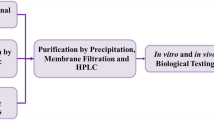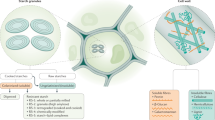Abstract
Purpose of Review
Soy isoflavones are known to have beneficial effects on several aspects of gastrointestinal physiological functions (contractility or motility, secretion, morphology, and barrier function). In this review, we discuss the effects of soy isoflavones on the overall gut function and inflammation and assess how these effects might be implicated in the treatment of several gut-related diseases.
Recent Findings
Soy isoflavones influence several key aspects of gastrointestinal health: improve basal intestinal secretion, alleviate inflammation, limit intestinal morphological damage, and improve epithelial barrier function in several clinically relevant murine models of gastrointestinal diseases.
Summary
Dietary supplementation with isoflavones proves to be a key means to improve the overall gut function and health. Future mechanistic studies with isoflavone interventions will help treat clinically related diseases such as cystic fibrosis and inflammatory-related gut problems such as colitis and diabetes.
Similar content being viewed by others
References
Papers of particular interest, published recently, have been highlighted as: • Of importance
Peery AF, Crockett SD, Murphy CC, Lund JL, Dellon ES, Williams JL, et al. Burden and cost of gastrointestinal, liver and pancreatic diseses in the United States: update 2018. Gastroentorology. 2019;156(1):254.
Burns G, Pryor J, Holtmann G, Walker MM, Talley NJ, Keely S. Immne activation in functional gastrointestinal disorders. Gastroenterol Hepatol. 2019;15:539–48.
Zhou Q, Zhang B, Verne GN. Intestinal membrane permeability and hypersensitivity in the iritable bowel syndrome. Pain. 2009;146:41–6.
Martinez C, Vicario M, Ramos L, Lobo B, Alonso C, Sanchez A, et al. The jejunum of diarrhea-predominant irritable bowel syndrome shows molecular alterations in the tight junction signaling pathway that are manifested with mucosal pathobiology and clinical manifestations. Am J Gastroenterol. 2012;107:736–46.
Everhart JE, Ruhl CE. Burden of digestive diseases in the United States part II: lower gastrointestinal diseases. Gastroenterology. 2009;136:741–54.
Pal S. Direct costs for digestive diseases. US Pharm. 2010;35:10–4.
Zhu C, Wu Y, Jiang Z, Zheng C, Wang L, Yang X, et al. Dietary soy isoflavone attenutaed growth performance and intestinal barrier functions in weaned piglets challenged with lipopolysaccharide. Int Immunopharmacol. 2015;28:288–94.
Catmull S, Masood F, Schacht S, Dolan R, Stegman D, Leung L, et al. Dietary genistein rescues reduced basal chloride secretion in diabetic jejunum via sex-dependent mechanisms. Cell Physiol Biochem. 2016;40:335–46.
Abron JD, Singh NP, Price RL, Nagarkatti M, Nagarkatti PS, Singh UP. Genistein induces macrophage polarization and systemic cytokine to ameliorate experimental colitis. PLoS One. 2018;13:e0199631.
• Lord R, Fairbourn N, Mylavarapu C, Dbeis A, Bowman T, Chandrashekar A, et al. Consuming genistein improves survival rates in the absence of laxative in deltaF508-CF female mice. Nutrients. 2018;10:1–12 This reference provides evidence that dietary genistein supplementation can preclude the dependence of CF mice for constant laxative use. Due to loss of CFTR function, CF intestines readily become impacted, genistein prevents this impaction.
Sato Y, Itagaki S, Oikawa S, Ogura J, Kobayashi M, Hirano T, et al. Protective effect of soy isoflavone genistein on ischemia-reperfusion in the rat small intestine. Biol Pharm Bull. 2011;34:1448–54.
Moussa L, Bezirard V, Salvator-Cartier C, Bacquie V, Lencina C, Leveque M, et al. A low dose of fermented soy germ alleviates gut barrier injury, hyperalgesia and faecal protease actrivity in a rat model of inflammatory disease. PLoS One. 2012;7:e49547.
Kamboh AA, Zhu W-Y. Individual and combined effects of genistein and hesperidin on immunity and intestinal morphology in lipopolysacharide-challenged broiler chikens. Poult Sci. 2014;93:2175–83.
Piegholdt S, Pallauf K, Esatbeyoglu T, Speck N, Reiss K, Ruddigkeit L, et al. Biochanin a and prunetin improve epithelial barrier function in intestinal CaCo-2 cells via downregulation of ERK, NF-KB and tyrosine phosphorylation. Free Radic Biol Med. 2014;70:255–64.
Jalili M, Vahedi H, Janani L, Poustchi H, Malekzadeh R, Hekmatdoost A. Soy isoflavones supplementation for patients with irritable bowel syndrome: a randomized double blind clinical trial. Middle East J Dig Dis. 2015;7:170–6.
Choi S, Woo J-K, Jang Y-S, Kang J-H, Jang J-E, Yi T-H, et al. Fermented Pueraria Lobata extract ameliorates dextran sulfate sodium-induced colitis by reducing pro-inflammatory cytokines and recovering intestinal barrier function. Lab Anim Res. 2016;32:151–9.
Calvello R, Aresta A, Trapani A, Zambonin C, Cianciulli ARS, Clodoveo ML, et al. Bovine and soybean milk bioactive compounds: effects on inflammatory response of human intestinal Caco-2 cells. Food Chem. 2016;210:276–85.
Bitzer ZT, Wopperer AL, Chrisfield BJ, Tao L, Cooper TK, Vanamala J, et al. Soy protein conventrate mitigates markers of colonic inflammation and loss of gut barrier function in vitro and in vivo. J Nutr Biochem. 2017;40:201–8.
Wang B, Wu C. Dietary soy isoflavones alleviate dextran sulfate sodium-induced inflammation and oxidative stress in mice. Exp Ther Med. 2017;14:276–82.
Gentile D, Fornai M, Colucci R, Pellegrini C, Tirotta E, Benvenuti L, et al. The flavonoid compound apigenin prevents colonic inflammation and motor dysfunctions associated with high fat diet-induced obesity. PLoS One. 2018;13:e0195502.
Vanden Braber NL, Novotny Nunez I, Bohl L, Porporatto C, Nazar FN, Montenegro MA, et al. Soy genistein administered in soluble chitosan microcapsules maintains antioxidant activity and limits intestinal inflammation. J Nutr Biochem. 2018;62:50–8.
Yazici S, Ozcan CU, Hismiogullari AA, Sunay FB, Ozcan T, Berksoy EA, et al. Protective effects of quercetin on necrotizing enterocolitis in a neonatal rat model. Am J Perinatol. 2018;35:434–40.
Atiq A, Shal B, Naveed M, Khan A, Ali J, Zeeshan S, et al. Diadzein ameliorates 5-fluorocil-induced intestinal mucositis by suppressing oxidateive stress and inflammatory mediators in rodents. Eur J Pharmacol. 2019;843:292–306.
• Guven B, Can M, Piskin O, Aydin BG, Karakaya K, Elmas O. Acikgoz B: Flavonoids protect colon against radiation induced colitis. Regul Toxicol Pharmacol. 2019;104:128–32 This reference provides interesting finding demonstrating the use of flavonoids to protect the GI tract against radiation-induced injury.
Luo Q, Cheng D, Huang C, Li Y, Lao C, Xia Y, et al. Improvements of colonic immune function with soy isoflavones in high-fat diet-induced obese rats. Molecules. 2019;24. https://doi.org/10.3390/molecules24061139.
Rehman K, Ali MB, Akash MSH. Genistein enhances the secretion of glucagon-like peptide-1 (GLP-1) via downregulation of inflammatory responses. Biomed Pharmacother. 2019;112:108670.
Jalili M, Vahedi H, Poustchi H, Hekmatdoost A. Soy isoflavones and cholecalciferol reduce inflammation, and gut permeability, without any effect on antioxidant capacity in irritable bowel syndrome: a randomized clinial trial. Clin Nutr ESPEN. 2019;34:50–4.
Yamamoto T, Matsunami E, Komori K, Hayashi S, Kadowaki M. The isoflavone puerarin induces Foxp3+ regulatory T cells by augmenting retinoic acid production, therby inducing mucosal immune tolerance in a murine food allergy model. Biochem Biophys Res Commun. 2019;516:626–31.
Shen J, Li N, Zhang X. Daidzein ameliorates dextran sulfate sodium-induced experimental colitis in mice by regulating NF-KB signaling. J Exp Pathol Toxicol Oncol. 2019;38:29–39.
Esposito S, Villella VR, Ferrari E, Monzani R, Tosco A, Rossin F, et al. Genistein antagonizes gliadin-induced CFTR malfunctionin models of celiac disease. Aging. 2019;11:2003–19.
Suzuki T, Hara H. Role of flavonoids in intestinal tight junction regulation. J Nutr Biochem. 2011;22:401–8.
Grubb BR. Ion transport across the normal and CF neonatal murine intestine. Am J Phys. 1999;277:G167–74.
Baker MJ, Hamilton KL. Genistein stimulates electrogenic Cl secretion in the mouse jejunum. Am J Phys. 2004;287:C1636–45.
Gharzouli K, Holzer P. Inhibition of guinea pig intestinal peristalsis by the flavonoids quercetin, naringenin, apigenin and genistein. Pharmacology. 2004;70:5–14.
Chao P-C, Hamilton KL. Genistein stimulates electrogenic Cl- secretion via phosphodiesterase modulation in the mouse jejunum. Am J Phys. 2009;297:C688–98.
Tuo B, Wen G, Song P, Xu J, Liu X, Seidler U, et al. Genistein stimulates duodenal HCO3− secretion through PI3K pathway in mice. Eur J Pharmacol. 2011;651:159–67.
Al-Nakkash L, Batia L, Bhakta M, Peterson A, Hale N, Skinner R, et al. Stimulation of murine intestinal secretion by daily genistein injections: gender-dependent differences. Cell Physiol Biochem. 2011;28:239–50.
Chen D-T, Xiong X, Tang Z, Lv B, Lin Y. Inhibitory effects of daidzein on intestinal motility in normal and high contractile states. Pharm Biol. 2012;12:1561–6.
Al-Nakkash L. Genistein stimulates jejunal chloride secretion via sex-dependent, estrogen receptor or adenylate cyclase mechanisms. Cell Physiol Biochem. 2012;30:137–50.
Xiong Y-J, Chen D-P, Lv B-C, Liu F-F, Wang L, Lin Y. The characteristics of genistin-induced inhibitory effects on intestinal motility. Arch Pharm Res. 2013;36:345–52.
Zhang L-X, Li H-F, Wang L-D, Jin S, Dou X-C, Tian Z-F, et al. Resveratrol and genistein inhibition of rat isolated gastrointestinal contractions and related mechanisms. World J Gastroenterol. 2014;20:15335–42.
Leung L, Bhakta A, Cotangco K, Al-Nakkash L. Genistein stimulates jejunum chloride secretion via an Akt-mediated pathway in intact female mice. Cell Physiol Biochem. 2015;35:1317–25.
Santos-Fagundes D, Grasa L, Gonzalo S, Valero MS, Castro M, Arruebo MP, et al. Different mechanisms of actions of genistein and quercetin on spntaneous conractions of rabbit duodenum. Rev Esp Enferm Dig. 2015;107:413–6.
Shin DH, Lee MJ, Jiao HY, Choi S, Kim MW, Park CG, et al. Regulatory roles of endogenous mitogen-activated protein kinases and tyrosine kinases in the pacemaker activity of colonic interstitial cells of Cajal. Pharmacology. 2015;96:16–24.
Schacht S, Masood F, Catmull S, Dolan R, Altabtabaee R, Grow W, et al. Dietary genistein influences number of acetylcholine receptors in female diabetic jejunum. J Diabetes Res. 2017;2017:3568146.
Isenberg JI, Selling JA, Hogan DL, Koss MA. Impaired proximal duodenal mucosal bicarbonate secretion in patients with duodenal ulcer. N Engl J Med. 1987;316:374–9.
Leung L, Kang J, Rayyan E, Bhakta A, Barrett B, Larsen D, et al. Decreased basal chloride secretion and altered CFTR, villin and GLUT5 protein expression in jejunum from ob/ob mice. Diabetes Metab Syndr Obes. 2014;7:1–10.
Sanders KM, Koh SD, Ward SM. Interstitial cells of cajal as pacemakers in the gastrointestinal tract. Annu Rev Physiol. 2006;68:307–43.
Farrugia G. Interstitial cells in health and disease. Neurogastroenterol Motil. 2008;20:54–63.
Amira S, Rotondo A, Mule F. Relaxant effects of flavonoids on the mouse isolated stomach: structure-activity relationships. Eur J Pharmacol. 2008;599:126–30.
Koike K, Moore FA, Moore EE, Read RA, Carl VS, Banerjee A. Gut ischemia mediates lung injury by a xanthine oxidase-dependent neutrophil mechanism. J Surg Res. 1993;54:469–73.
Wang H, Fowler MI, Messenger DJ, Terry LA, Gu X, Zhou L, et al. Homoisoflavonoids are potent glucose transporter 2 (GLUT2) inhibitors: a potential mechanism for the gluocse-lowering properties of Polygonatum odoratum. J Agric Food Chem. 2018;66:3137–45.
Jin M, Shen M-H, Jin M-H, Jin A-H, Yin X-Z, Quan J-S. Hypoglycemic property of soy isoflavones from hypocotyl in Goto-Kakizaki diabetic rats. J Clin Biochem Nutr. 2018;62:148–54.
Schleipen B, Hertrampf T, Fritzemeier KH, Kluxen FM, Lorenz A, Molzberger A, et al. ERΒ-specific agonists and genistein inhibit proliferation and induce apoptosis in the large and small intestine. Carcinogenesis. 2011;32:1675–83.
Zhang Y, Li Q, Zhou D, Chen H. Genistein, a soya isoflavone, prevents azoxymethane-induced up-regulation of WNT/B-catenin signalling and reduced colon pre-neoplasia in rats. Br J Nutr. 2013;109:33–42.
Chen Z, Yuan Q, Xu G, Chen H, Lei H, Su J. Effects of quercetin on proliferation and H2O2-induced apoptosis of intestinal procine enterocyte cells. Molecules. 2018;23:1–35.
Author information
Authors and Affiliations
Corresponding author
Ethics declarations
Conflict of Interest
All authors declare that they have no conflict of interest
Human and Animal Rights and Informed Consent
This article does not contain any studies with human or animal subjects performed by any of the authors.
Additional information
Publisher’s Note
Springer Nature remains neutral with regard to jurisdictional claims in published maps and institutional affiliations.
This article is part of the Topical Collection on Functional Foods
Rights and permissions
About this article
Cite this article
Al-Nakkash, L., Kubinski, A. Soy Isoflavones and Gastrointestinal Health. Curr Nutr Rep 9, 193–201 (2020). https://doi.org/10.1007/s13668-020-00314-4
Published:
Issue Date:
DOI: https://doi.org/10.1007/s13668-020-00314-4




